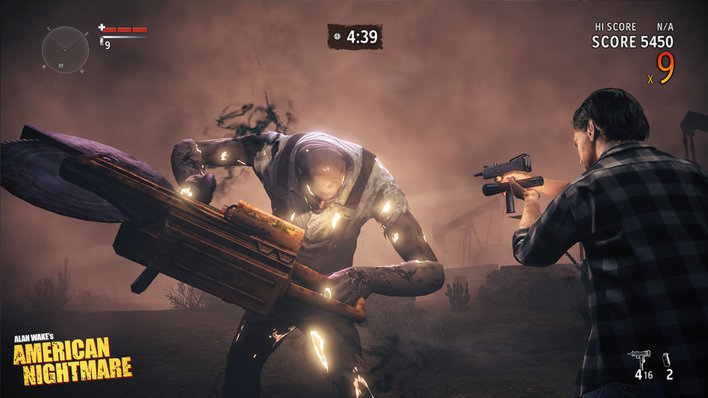Originally released back in 2010, the original Alan Wake proved to be incredibly popular with the staff at Everybody Plays. With a twisting, involving storyline, believable characters, and appealing, yet fairly minimal combat, the game was played just like a good book - once you started, you couldn't put it down, as you felt you just had to find out what happened, and where the story was going. Telling the tale of a writer named Alan Wake, who takes a trip to a town called Bright Falls to recharge his writing batteries, things quickly take a turn for the mysterious, as his wife, Alice, gets kidnapped by a mysterious force, and things around him keep... changing, moving places, as though they're somehow possessed by the darkness. It was a rollercoaster ride, and we loved it - so much so we gave it 9/10 in our review.
Alan Wake's American Nightmare, however, is something of a departure from the formula that previously worked so well. A downloadable game that costs just over £10 (1200 Microsoft Points), American Nightmare is intended as a stand alone game, that anyone can pick up without having played the original - but, well, you can't. It's odd. Even if you've played Alan Wake til the end, the story in American Nightmare feels like it doesn't really follow on, yet you're pretty much required to have played the original game to have even the slightest clue as to what's going on. It's odd. Had you not played the original, you'd have no idea who Alice was, what the darkness was all about, that keeps possessing inanimate objects - you're basically dropped into the Arizona desert without so much of an explanation why - yet the story doesn't tie in with Alan Wake properly, either. To get the full experience, and understand what's going on, you'll have had to have played the two downloadable add-ons for Alan Wake, too. So much for being a stand alone, then.

Creepy, right?
The story this time around revolves around Mr. Scratch, a creation of the darkness which is effectively Alan Wake's evil twin. Caught in a gaming version of Groundhog Day, it's up to you to thwart Mr. Scratch's evil plans, by following the messages you find lying around in certain scenes. The whole idea is, by adjusting certain parts of certain areas, you'll be able to make reality appear as it does in the pages of the manuscript, which in turn will help free you from the endless cycle. Of course, things aren't quite as easy as they seem, as to begin with, you don't have the entirety of the messages to work with - so you'll end up playing through the same three sections three times over, taking in an oil rig near a diner, an observatory, and a drive-through cinema, each time with a greater idea of where you're going wrong.
The problem is, rather than focus on Alan Wake's strengths (its storyline), instead, American Nightmare decides to put combat front and centre. Almost entirely eschewing a decent storyline in favour of generic running and gunning, you'll find yourself having to blast through wave after wave of enemy without all that much of a reason why.
Following roughly the same format as the original game, things here have been tweaked only slightly. Most enemies you come across have been enveloped by the darkness, meaning your torch is your primary weapon. Aiming with the right analogue stick, and holding the left trigger down to boost its power, you have to shine your light to break down the darkness that cloaks them, before firing off a few shots with whatever weapon you have handy. In American Nightmare, the developers have attempted to add a little bit more variety to the combat, but all it's really done is make things a bit more awkward. Now, some enemies you come across will split in two, should you shine the torch on them, while others throw annoying "darkness grenades" at you, which, as you may imagine, are black, and therefore almost impossible to see until they explode in front of you.

Break through the darkness shield, and let 'em have it.
In a sort-of-positive, sort-of-negative, you do now have a health bar - the only problem is, you can only take four hits, and only the very last segment of the bar ever regenerates. In order to replenish your health, you'll have to find your way to one of the few working lights that have been scattered around, which will then magically heal your beaten body. Intended to heighten the tension, you'll often find yourself surrounded by enemies, with your health running low, where a quick press of the right bumper will drop a flare, buying you some time to leg it to the nearest light. You can also press the left bumper to dodge an enemy, if you time it just right.
But while the combat may be disappointing, it's the storyline that's American Nightmare's major downfall. You're living in a nightmare world, but each of the people you come across seem perfectly calm, despite the monsters roaming around just outside. Some of the voice acting is genuinely terrible, too, making losing yourself in Alan's less enticing world even harder. Little is done to explain who Mr. Scratch is, and why he hates you so much, and, as we mentioned in the intro, he takes part in a story that doesn't seem to really fit in with what we understood from Alan Wake, yet simultaneously requires you to have played the original to understand what's going on. Perhaps the moment that most accurately sums up the problems with American Nightmare comes towards the end of your first run through, when you meet a woman in a projection house at the drive through, who engages you in a somewhat bland conversation about your wife, and her work (a film made by her is set to be shown on the screen that evening), before casually adding on the end "By the way, everyone thought you were dead?". Surely if someone thought you were dead, that would be the first thing they say? Wouldn't they be a little bit hysterical? Not in American Nightmare. Obviously things like that have just become standard around here.
Outside the main story mode, there's a new (you guessed it) combat based mode that's under the inventive moniker of "Arcade". Challenging you to simply survive until daybreak, this mode throws wave after wave of baddies at you, as you try to ration your ammo, and basically maintain a decent distance between you and them in an attempt to amass a decent score before sunrise. If the main game had less of an emphasis on combat, this would be a nice change of pace, but as it stands, it's pretty much the same as the story mode - just this time you've got a score.
With few worthwhile diversions from the combat (manuscript pages have been scattered around each area, which unlock new weapons when you've collected enough, although there's little other incentive to explore), and the few changes to the combat having only managed to make it worse, American Nightmare is something of a disappointment for anyone looking to lose themselves in a good story all over again. While it's still a fairly solid game, there's little here that'll make you want to come back time, and time again, as we do with Alan Wake - which just serves to highlight just how good, and how important the story was to the original. Without a decent plot, it just ends up feeling like Alan's lost his muse. Ironic, eh?
Format Reviewed: Xbox 360

















